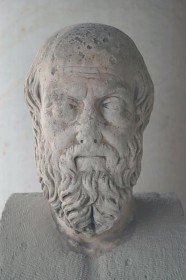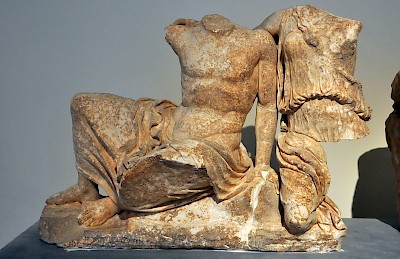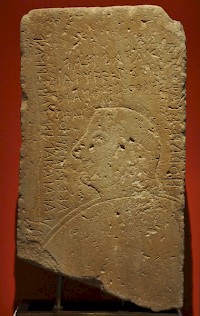Pelasgians
Q107822Pelasgians (Greek Πελασγοί): legendary indigenous population of Greece.
The Limits of Knowledge

The ancient Greeks only understood their direct neighbors. For example, the fifth-century researcher Herodotus of Halicarnassus, who had visited Egypt, Scythia, and southern Italy, was unable to comprehend the far east. It was, he believed, the country of the Assyrians, whose capital was Babylon, and whose empire was taken over by the Medes and the Persians. That Babylon was the capital of Babylonia and that there had been a Babylonian Empire between the Assyrian and Persian periods, was unknown to Herodotus.
If geographical distance was difficult, temporal distance was even harder to comprehend. After all, Herodotus lived in an age without a common era, without real archives, and without quotable historians – after all, he was the first historian. Still, he was not completely helpless: important Greek families (like the Alcmeonids in Athens) knew the names of some ancestors, six or seven or perhaps even eight generations deep. This allowed Herodotus to reconstruct at least a part of the past, let’s say since the last quarter of the seventh century BCE.
The really deep past was unknown. There were stories about the Trojan War, which Herodotus placed eight centuries before himself,note and there were some myths. But in fact, he hardly comprehended the deep past. Still, he had to assume that there had been people living back then, if only because there were stories about the way the Greeks had settled in their own country. For example: when Cadmus, the founder of Thebes, arrived, there was already a sanctuary in Delphi. There had to have been an indigenous population prior to the coming of the Greeks.
Picking up a name from Homer,note Herodotus and several other ancient authors called them Pelasgians. The main question is: were the Pelasgians more than a synonym for "earlier people"? Was there ever a tribe or a nation living in Greece that fits the description by the ancient authors? We will first see what Herodotus has to offer, will then have a look at other authors, and will establish that there are two meanings of the word.
Athenian Pelasgians

To start with, most Greeks assumed that the people of Athens were autochthonous, born from the earth. Just like the Pelasgians, they had their origin in the deep, deep past. Therefore, the ties between the Pelasgians and the Athenians were quite close, but Herodotus is inconsistent about the exact relation. Once, he implies that the Pelasgians were immigrants themselves and had come to live with the Athenians,note but he also states that the Ionians (and therefore: Athenians) were originally called Pelasgians.note

Herodotus is aware of at least one Athenian myth about the Pelasgians, which he presents as a local tradition that is partly confirmed by Hecataeus. In former times, the Athenians lived on the Acropolis and the Pelasgians near the Hymettus, but the Athenians expelled the Pelasgians, who settled on Lemnos.note Later, the Pelasgians captured Athenian women from Brauron,note and there was a prophecy that the Pelasgians would one day have to surrender their island to the Athenians, which was indeed conquered by Miltiades.note
The whole story may have been invented to justify the Athenian annexation of these islands. The only base in reality may have been that the Lemnians spoke an unusual language (which may have been related to Etruscan). This is why Herodotus says that there were Pelasgians on Lemnos and Imbros in his own age.note He also calls Antandrus a Pelasgian city, says that Samothrace used to be Pelasgian, and knows people who speak Pelasgian near the Sea of Marmora.note Both were in the same general direction: the northeast of the Aegean Sea. Interestingly, when Homer refers to the Pelasgians, he places them on Crete and in northwestern Anatolia,note while Herodotus also refers to Pelasgians in Arcadia, in the northern Peloponnese, on the Ionian islands, Thessaly,note and in an unidentified town called Creston.note
Other Indigenous People
It seems that Herodotus called all early people Pelasgians: they only exist to offer invaders someone to expel. However, occasionally the name of the original inhabitants of a country are too well-known to ignore.
- The indigenous people on the Peloponnese were the Caucones;note
- The first inhabitants of Caria were the Leleges, who are also known from Homer, which was evidence that Herodotus could not ignore;note
- The early Boeotians were called Cadmaeans;note
- The first people in Lydia were the Meiones, who are also known from Homer and Hittite sources.note
Reconstructing Pelasgian Society
Herodotus tries to reconstruct the world of the ancient Pelasgians, which he calls Pelasgia.note He knows that in several towns the Pelasgian language is still spoken,note believes that the use of herms and the Mysteries of the Cabiri were created by the Pelasgians,note, and assumes that the Pelasgians accepted several kinds of religious rituals from Libya and Egypt.note
Other Authors
So far, we have seen that Herodotus of Halicarnassus uses the word “Pelasgians” in two meanings:
- for people with a language of their own, living in the northeastern part of the Aegean Sea (Samothrace, Imbros, Lemnos, Antandrus, Sea of Marmora),
- for an ancient, pre-Greek population, which he situates on the Peloponnese, in Athens, on the Ionian islands, and in Thessaly.
There is a bit more evidence. Homer mentions Pelasgians on Crete, in Dodona in Epirus, in northwest Anatolia, and in Thessaly.note The geographer Strabo of Amasia, who uses as his source Ephorus of Cyme, describes the Pelasgians as people who settled in Greece, but does not mention where they came from; he mentions them in Dodona, Thessaly, Chios, and Etruria.note None of our authors - Homer, Hecataeus, Herodotus, Ephorus, Strabo - presents the old Pelasgians as Greeks, and all these writers are describing the ancient Pelasgians.
There is also evidence that confirms Herodotus' description of fifth-century Pelasgians in the northeastern part of the Aegean Sea: Herodotus' younger contemporary Thucydides refers to Pelasgians living on the Athos peninsula.note Thucydides also mentions the Pelasgians in the first sense, as very ancient inhabitants of Greece.note
Summing Up
It seems that Herodotus considers the Pelasgians of his own age as the remains of the older Pelasgians, and although Thucydides seems to accept this, it is just an opinion. We cannot be certain.